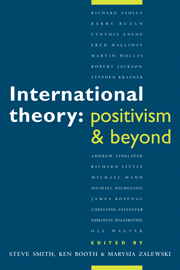Book contents
- Frontmatter
- Contents
- List of contributors
- Preface and acknowledgements
- Introduction
- I Debates
- II Legacies
- III Silences
- IV Openings
- 10 Authoritarian and liberal militarism: a contribution from comparative and historical sociology
- 11 The achievements of post-structuralism
- 12 The contributions of feminist theory to international relations
- 13 The achievements of critical theory
- V Directions
- Index
10 - Authoritarian and liberal militarism: a contribution from comparative and historical sociology
Published online by Cambridge University Press: 09 March 2010
- Frontmatter
- Contents
- List of contributors
- Preface and acknowledgements
- Introduction
- I Debates
- II Legacies
- III Silences
- IV Openings
- 10 Authoritarian and liberal militarism: a contribution from comparative and historical sociology
- 11 The achievements of post-structuralism
- 12 The contributions of feminist theory to international relations
- 13 The achievements of critical theory
- V Directions
- Index
Summary
Introduction
I have been asked to write on the theoretical contribution that historical sociology has made to International Relations (IR). This puts me in a quandary. I am not an admirer of what passes for theory among academics, all those abstract -isms and -ologies. I have no stamina for those in my own academic specialism, sociology, let alone for those in International Relations. I am more a consumer than a producer of international relations research, one of those ‘general readers’ on whom the sales of IR books depend. Thus what I need from IR specialists is not the positivist, pluralist, realist, structuralist (classical, neo- and post-) scholastic games of schoolmen (and women), but substantive theory about real-world international relations. More precisely, what we outsiders really want from IR is substantive theory on its most important issue of all: the question of war and peace. So in the same spirit I do not offer here yet another school or -ology – historical sociology. Instead I offer a modest substantive theory, from the point of view of a comparative and historical sociologist, on the centrality of ferocious militarism to our own Western society. I will build upon one of comparative and historical sociology's favourite themes – the contrast between authoritarian and liberal-democratic movements and regimes. I draw out its implications for the IR issue, the matter of war and peace. These movements and regimes generated two major and ferocious forms of militarism, central to Western civilisation, but often neglected by IR theory. I shall call these ‘nation-statist’ and ‘civil society’ militarism.
- Type
- Chapter
- Information
- International TheoryPositivism and Beyond, pp. 221 - 239Publisher: Cambridge University PressPrint publication year: 1996
- 17
- Cited by



